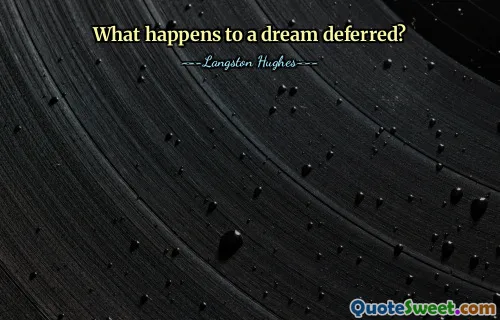Langston Hughes was a prominent figure in the Harlem Renaissance, known for his influential contributions to African American literature. His work often illustrated the struggles and joys of black life in America, blending jazz rhythms with poetry. Hughes sought to give voice to the black experience, celebrating their culture while also addressing the social injustices faced by the community. His writing emphasized the importance of authenticity and the rich musical traditions of African Americans. Hughes's poetry is characterized by its accessibility and emotional depth, resonating with readers across various backgrounds. He experimented with different styles and forms, infusing his works with elements of blues and jazz, which helped bridge literary and musical expression. His famous poems like "The Negro Speaks of Rivers" and "I, Too" capture both the pain of racial discrimination and the undeniable strength of resilience. Beyond poetry, Hughes also dabbled in essays, short stories, and plays, further showcasing his versatility as a writer. His efforts extend beyond literature, as he became an important cultural symbol advocating for civil rights. Hughes's legacy endures through his timeless works that continue to inspire new generations of writers and activists seeking to address racial inequality and celebrate black identity.
Langston Hughes was a key figure in the Harlem Renaissance, known for his impactful contributions to African American literature. His work often portrayed the complexities of black life in America, blending cultural elements and responding to social injustices.
His poetry is marked by emotional depth and rhythm, utilizing jazz influences to connect with readers. Works like "The Negro Speaks of Rivers" highlight the struggles and resilience of the African American experience.
Hughes's influence extended beyond poetry into essays, short stories, and plays, advocating for civil rights and inspiring future generations. His legacy remains strong as his writings continue to resonate in contemporary discussions on race and identity.
More »
Today Birthdays
1729 -
Edmund Burke
1949 -
Haruki Murakami
1954 -
Howard Stern
1876 -
Jack London
1993 -
Zayn Malik
1951 -
Kirstie Alley
1863 -
Swami Vivekananda
1923 -
Alice Miller
1987 -
Naya Rivera
1825 -
Brooke Foss Westcott
1944 -
Joe Frazier
1951 -
Rush Limbaugh
1964 -
Jeff Bezos
1978 -
Jeremy Camp
1628 -
Charles Perrault
1856 -
John Singer Sargent
1970 -
Kaja Foglio
1953 -
Rick Santelli
1986 -
Gemma Arterton
1968 -
Raf Simons
1958 -
Christiane Amanpour
1966 -
Olivier Martinez
1996 -
Ella Henderson
1917 -
Maharishi Mahesh Yogi
1949 -
Ottmar Hitzfeld
1928 -
Ruth Brown
1968 -
Heather Mills
1946 -
George Duke
1968 -
Rachael Harris
1923 -
Ira Hayes
